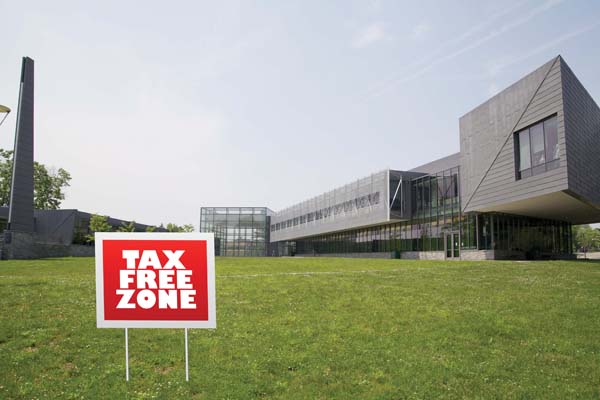Yonkers city officials have adopted a green building standards law pushed by the mayor that mandates energy-efficient building designs for new and renovated city-owned properties but does not require private developers to comply with the same environmental standards for commercial and larger residential construction projects.
Instead the ordinance, unanimously adopted in May by the Yonkers City Council and signed into law by Mayor Mike Spano, states that city officials “should encourage” the use of green building standards for private projects. For data collection purposes only, the ordinance requires a green buildings survey checklist to be filed with site plan applications for commercial projects of more than 15,000 square feet and housing developments of more than 25 units.
City officials when adopting the law noted that buildings are among the heaviest consumers of natural resources and account for a significant portion of the greenhouse gas emissions that affect climate change. In the U.S., buildings account for 38 percent of all carbon dioxide emissions and 73 percent of electricity consumption.
The green buildings law follows the city”™s effort this year to collect data on the energy usage of all municipal buildings to calculate greenhouse gas emissions. The mayor”™s office said the data showed that inefficiencies contribute to more than two-thirds of all the city”™s emissions.
“Municipal governments need to assume the leadership role in promoting energy efficiency,” Spano said in a press release. “We are all responsible for our current environment and now we must be part of the solution.”
The green building standards were developed by Brad Tito, the city”™s director of sustainable development, working with the Yonkers Green Policy Task Force and a working group of environmentalists and real estate developers.
The city task force four years ago developed a more broadly inclusive green buildings law for most new construction and substantially rehabilitated buildings that was adopted by the City Council. Former Mayor Philip Amicone, though, vetoed the legislation, citing a number of legal concerns of the city”™s corporation counsel.
Amicone called the law, which required commercial buildings to meet a nationally recognized green building standard and compliance verification by a third party, “unenforceable and in fact illegal.” He said a green buildings law was needed in Yonkers, “but it has to be one that works” and must “strike the right balance between regulations and incentives, marrying environmental concerns with economic realities.”
Yonkers resident Terry Joshi, chairperson of the Green Policy Task Force, noted that “the whole field of green building and energy efficiency has moved on” since the vetoed law was drafted in 2009. That law required developers to meet a national design standard of either the U.S. Green Building Council or The Green Building Initiative.
“This is a way better version,” she said of the new law. “This is Yonkers-centric.”
Still, she said, “It doesn”™t do really anything much for commercial buildings.”
“This is the most we could get” from the Spano administration, Joshi said. The mayor proposed the law that was adopted. Joshi said he opposed mandatory standards for private developments and told the group working on the ordinance instead “to come back with incentives” for developers.
Joshi said Spano at a later meeting said no incentives would be offered and implementing green standards should simply be optional for private developers.
Though some developers in the city favor higher energy efficiency standards, Joshi said, some in Yonkers still hold the perception that green building design costs more and “is an impediment to development,” she said.
Joshi said she was hopeful that commercial and larger residential projects before long will be required to meet the new environmental standards. “In a year or so, when the dust settles and people realize it”™s not so complicated, we”™ll go ahead with it,” she said.
Joshi in a statement following the council”™s adoption of the ordinance said the Green Policy Task Force as a next step encouraged the city to immediately “enforce these green building standards on all city construction over four-family homes. It is not an exaggeration to say that each tiny step taken by a single municipality, will, in the aggregate, work to mitigate future climate change.”
Like Joshi, some City Council members called the green buildings ordinance a good first step.
Council President Chuck Lesnick in a statement said, “It is crucial that the city has recognized the importance of green building standards and has referenced them in our city code. While I would have preferred that a minimum score be required for all new development, at least now policy makers on the city council, the industrial development agency and the planning and zoning boards will be aware of the standards and can encourage developers to use them.”





















Comments 1